|
|
|
Sort Order |
|
|
|
Items / Page
|
|
|
|
|
|
|
| Srl | Item |
| 1 |
ID:
122392
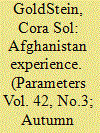

|
|
|
|
|
| Publication |
2012.
|
| Summary/Abstract |
On 7 October 2001, the Bush administration launched Operation Enduring
Freedom (OEF) to dislodge al Qaeda forces, neutralize the Taliban in
Afghanistan, and decapitate their respective leadership. President Bush insisted
that the United States was not at war with the Afghan people or with Islam,
and the Afghan civilian population was not identified as the enemy. Therefore,
the Pentagon attempted to minimize civilian casualties. OEF toppled the
Taliban regime, but did not eliminate the Taliban influence in Afghanistan. The
Taliban, although expelled from power, still preserved connections with the
rural Pashtun.
|
|
|
|
|
|
|
|
|
|
|
|
|
|
|
|
| 2 |
ID:
126202
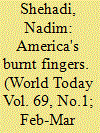

|
|
|
| 3 |
ID:
100849
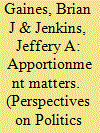

|
|
|
|
|
| Publication |
2009.
|
| Summary/Abstract |
The 2000 presidential election made various electoral institutions-from ballot format to voting mechanisms-suddenly prominent in public debate. One institution that garnered little attention, but nonetheless affected the outcome, was apportionment. A few commentators, looking ahead to 2004, noticed that Bush would have won more comfortably had the apportionment based on the 2000 census already been in place for the 2000 election. Little attention, however, was paid to the method by which 1990 census data were used to generate the 1992-2000 apportionment, even though there are many ways to perform that allocation, the United States has used different methods over its history, and the precise algorithm turned out, in this instance, to matter. More generally, previous discussions of apportionment methods have neglected the point that allocation to states of US House seats simultaneously determines Electoral College weights. Since the Electoral College has built-in biases favoring small states, an apportionment method that partially offsets this bias might be justifiable. We revisit some criteria by which one might prefer one apportionment rule to another, in light of this double duty.
|
|
|
|
|
|
|
|
|
|
|
|
|
|
|
|
| 4 |
ID:
173443
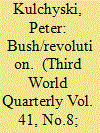

|
|
|
|
|
| Summary/Abstract |
This article argues that bush people deserve greater attention in revolutionary thought and action, both for the strategic value of their struggles against extraction at capital’s periphery and the emancipatory social values they continue to embody. But bush struggles cannot be borrowed for other purposes: the agenda of bush people for respect and cultural survival must respected in its own right.
|
|
|
|
|
|
|
|
|
|
|
|
|
|
|
|
| 5 |
ID:
091870
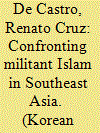

|
|
|
|
|
| Publication |
2009.
|
| Summary/Abstract |
This article discusses the Bush administration's extension of the War on Terror in Southeast Asia and this operation's main objective-the Abu Sayyaf Group (ASG) in the Philippines. It probes the ASG's history, transnational links, and terrorist operations. Then using content analysis, the article analyzes the terrorist group's primary reading material to determine its ideological affiliation with transnational Islamic militant groups. It then argues that the transnational jihadist ideology is evident in the ASG's primary reading material. The material reflects the ideas of the late Palestinian terrorist Abdullah Azzam, and by implication, those of the late Egyptian poet Sayyid Qutb. In conclusion, the article points out that the influence of jihadist ideology on the ASG is superficial, because of the widely held view that the band is a marginalized group operating at the fringes of the mainstream militant Islamic movement in Southeast Asia.
|
|
|
|
|
|
|
|
|
|
|
|
|
|
|
|
| 6 |
ID:
100492
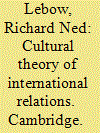

|
|
|
|
|
| Publication |
Cambridge, Cambridge University Press, 2008.
|
| Description |
xi, 762p.
|
| Standard Number |
9780521691888
|
|
|
|
|
|
|
|
|
|
|
|
Copies: C:1/I:0,R:0,Q:0
Circulation
| Accession# | Call# | Current Location | Status | Policy | Location |
| 055507 | 327.101/LEB 055507 | Main | On Shelf | General | |
|
|
|
|
| 7 |
ID:
105370
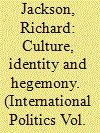

|
|
|
|
|
| Publication |
2011.
|
| Summary/Abstract |
This article explores the social and political construction of US counterterrorism policy since the onset of the war on terrorism. The first part of the article focuses on the period of the Bush administration. It explores the cultural grammar expressed in the language of the war on terror, as well as administration attempts to 'sell' the policy to the American public. In addition, it explores the ways in which the war on terror has been institutionalised in counterterrorism practices and institutions, and how it has been normalised and embedded in American popular culture and linked by the national identity narratives surrounding '9/11' and the negative ideograph of 'terrorism', to American identity. Section two of the article explores the discourse and practice of the war on terrorism in the initial period of the Obama administration. It questions the extent to which counterterrorism policy can be rewritten, given the degree to which it accords with the deep cultural grammar of American identity and is now a well-established ideograph, the extent to which it has been institutionalised in American political practice and embedded in American culture and the ways in which it is rooted in the political-economic interests of the American polity and empire. Finally, the article briefly reflects on questions of change and identity in the construction of US foreign policy.
|
|
|
|
|
|
|
|
|
|
|
|
|
|
|
|
| 8 |
ID:
102455
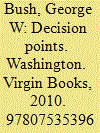

|
|
|
|
|
| Publication |
Washington, Virgin Books, 2010.
|
| Description |
xii, 497p.hbk
|
| Standard Number |
9780753539668, hbk
|
|
|
|
|
|
|
|
|
|
|
|
Copies: C:1/I:0,R:0,Q:0
Circulation
| Accession# | Call# | Current Location | Status | Policy | Location |
| 055859 | 973.931092/BUS 055859 | Main | On Shelf | General | |
|
|
|
|
| 9 |
ID:
095128
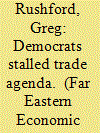

|
|
|
| 10 |
ID:
105356
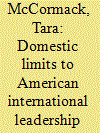

|
|
|
|
|
| Publication |
2011.
|
| Summary/Abstract |
In this article it is argued that there is a striking absence from contemporary academic (and policy) discussions about American international leadership, and that is the domestic dimension to international leadership. Most current discussion focuses upon the actions of the Bush administration in the international sphere, which is argued to have eroded legitimate American leadership. It is hoped that Obama can reinvigorate American leadership through his actions in the international sphere. Here, however, it is argued that legitimate American leadership during the Cold War was based firstly upon a specific domestic political context in Europe. This specific domestic political context has steadily changed since the late 1960s, eroding legitimate American international leadership. In the absence of this domestic context, America will not be able to reassert legitimate leadership. International legitimacy, like charity, must begin at home in the domestic political sphere.
|
|
|
|
|
|
|
|
|
|
|
|
|
|
|
|
| 11 |
ID:
143235
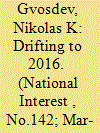

|
|
|
|
|
| Summary/Abstract |
THE 2016 PRESIDENTIAL campaign is turning into a mirror of the 2008 race. Democratic frontrunner Hillary Clinton seeks to distinguish herself from the policies of the sitting chief executive, while sundry Republican candidates maintain that Obama’s incompetence has made America less safe and diminished its position in the world. No one seeking to become Barack Obama’s successor is promising to continue his approach in foreign policy, just as, in 2008, no one ran on a platform of adopting the policies of the George W. Bush administration.
|
|
|
|
|
|
|
|
|
|
|
|
|
|
|
|
| 12 |
ID:
091912
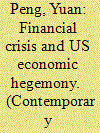

|
|
|
|
|
| Publication |
2009.
|
| Summary/Abstract |
The US financial crisis and its result- a severe recession-are spreading quickly across the world. Why has the US, the head of the world economy, been hit so hard all of a sudden? Or is the US economy indeed suffering so much? what impact does the crisis have on the future of US economic hegemony? or will the crisis condiderably weaken the comprehensive strength of the US and thus change its relations with all other countries in the world?
|
|
|
|
|
|
|
|
|
|
|
|
|
|
|
|
| 13 |
ID:
096169
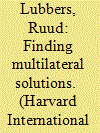

|
|
|
| 14 |
ID:
123639
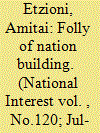

|
|
|
| 15 |
ID:
092192
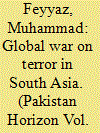

|
|
|
|
|
| Publication |
2009.
|
| Summary/Abstract |
On 20 September 2001, during a televised address to a joint session of Congress, President George W. Bush launched his war on terror, also referred to as the Global War on Terror, Global War on Terrorism.
|
|
|
|
|
|
|
|
|
|
|
|
|
|
|
|
| 16 |
ID:
119399
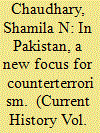

|
|
|
| 17 |
ID:
096283
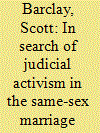

|
|
|
|
|
| Publication |
2010.
|
| Summary/Abstract |
In 2006, President Bush publicly stated that, in relation to the same-sex marriage issue, "activist judges" were thwarting the preferred policy of the elected representatives and the expression of popular will embodied in popular initiatives and constitutional amendments. Notwithstanding the philosophical discussion of the constitutionally assigned role of courts in the political system and the idea of judicial independence, President Bush's statement raises an interesting empirical question: In the case of same-sex marriage, have state and federal courts really acted in direct opposition to the expressed policy preferences of current or recent legislative majorities or overturned popular initiatives and constitutional amendments? Using evidence from state and federal legislative and judicial action around same-sex marriage primarily from the fifteen years preceding President Bush's 2006 statement, I argue that, with some rare exceptions, judges can not easily be identified as "activist" on the issue of same-sex marriage even if we assess their actions according to President Bush's criteria.
|
|
|
|
|
|
|
|
|
|
|
|
|
|
|
|
| 18 |
ID:
100443
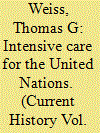

|
|
|
| 19 |
ID:
107288
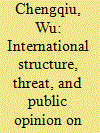

|
|
|
|
|
| Publication |
2011.
|
| Summary/Abstract |
In the first decade of the 21st century, United States foreign policy developed a dramatic trajectory, undergoing a unilateralist turn under President George W. Bush and a multilateralist turn under President Barack Obama.1 Under the Bush administration, the United States not only withdrew from or undermined such multilateral international treaties as the Kyoto Protocol, the Rome Statute establishing the International Criminal Court, the Biological Weapons Convention, and the Chemical Weapons Convention, but also disregarded collective security mechanisms and multilateral international organizations to pursue its own security agenda by invading Iraq in 2003 without explicit authorization from the United Nations. In contrast, under the Obama administration, the United States on the one hand restored its relations with European allies, Russia, Latin American countries, and the Islamic World, and on the other promoted soft diplomacy with regards to various global issues, including the recent financial crisis, climate change, and nuclear proliferation. The contrast is even more telling when we juxtapose the two presidents' National Security Strategy documents. The Bush administration adopted in September 2002 a new national strategy allowing for pre-emptive strikes, whereas the Obama administration's National Security Strategy released in May 2010 emphasized building US economic strength at home and shaping the international order through engagement with other countries in order to strengthen international institutions and galvanize collective action.2 According to Obama's document, while 'the United States must reserve the right to act unilaterally if necessary', it 'will draw on diplomacy, development, and international norms and institutions to help resolve disagreements, prevent conflict, and maintain peace, mitigating where possible the need for the use of force.'3
What were the causes of Bush's turn to a unilateralist foreign policy approach and Obama's turn to a multilateralist one? To my knowledge, no study explains the two foreign policy changes under
|
|
|
|
|
|
|
|
|
|
|
|
|
|
|
|
| 20 |
ID:
103243
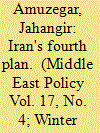

|
|
|
|
|
|
|
|